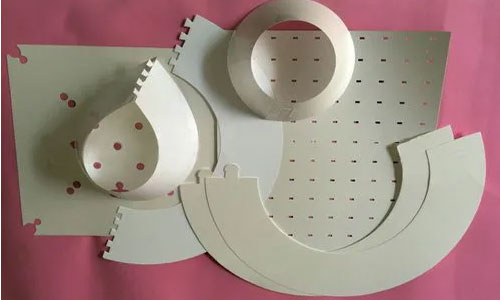
Non-metallic materials refer to a wide range of materials that do not contain metal elements. These materials have different characteristics and properties compared to metals, and they are commonly used in various industries for different applications. Some common non-metallic materials include plastics, rubber, foam, textiles, paper, and composites.
Here are some characteristics of non-metallic materials and their die cutting applications:
1. Plastics: Plastics offer versatility, durability, and low cost. They can be die cut into various shapes and sizes for applications such as packaging, automotive parts, consumer goods, and electronics.
2. Rubber: Rubber materials are known for their elasticity and flexibility. They can be die cut into gaskets, seals, O-rings, and other components used in automotive, aerospace, and industrial applications.
3. Foam: Foam materials, such as polyurethane foam and neoprene foam, offer cushioning and insulation properties. They can be die cut into padding, insulation sheets, protective packaging, and acoustic panels.
4. Textiles: Textile materials, including fabrics and non-woven materials, are commonly used in clothing, upholstery, and industrial applications. They can be die cut into fabric patterns, patches, labels, and other textile components.
5. Paper and cardboard: Paper and cardboard materials are lightweight and can be easily die cut into various shapes and designs. They are commonly used for packaging, labels, displays, and other paper-based products.
6. Composites: Composites are materials made by combining different materials, such as fibers and resins. They offer high strength-to-weight ratio and can be die cut into components used in aerospace, automotive, and sports equipment industries.
Die cutting non-metallic materials requires understanding their specific properties and characteristics. Some important considerations for die cutting non-metallic materials include:
1. Material thickness and hardness: Different non-metallic materials have different thicknesses and hardness levels, which can affect the die cutting process. Adjustments may be needed in terms of die cutting force and blade selection.
2. Material flexibility: Non-metallic materials can vary in their flexibility and elasticity. Special techniques may be required to prevent distortion or stretching during the die cutting process.
3. Material composition: Some non-metallic materials, such as composites, may have multiple layers or components. Die cutting these materials may require special tools or techniques to ensure clean and accurate cuts.
4. Surface finish: The surface finish of non-metallic materials can impact the quality of the die cut. Smooth and even surfaces are generally easier to cut compared to textured or uneven surfaces.
Overall, understanding the characteristics of non-metallic materials and considering their specific die cutting requirements is crucial for achieving precise and accurate results in die cutting applications.
Here are the topics that we’ll cover in this complete guide Rotary Die Cutting in Industrial Applications Section 2: Categories of Materials in Die Cutting:
2.1 Plastics: Types, Applications, and Die Cutting Considerations
2.3 Medical Supplies: Die Cutting Challenges and Solutions
2.4 Paper Products: Die Cutting Techniques and Applications
2.5 Neoprene, Film, and Vinyl: Die Cutting Techniques and Applications
2.6 Automotive Components: Die Cutting Solutions for Efficient Production
2.7 Electronics: Die Cutting for Precision and Performance
2.8 Non-Wovens: Die Cutting Techniques for Enhanced Efficiency
2.9 Chipboard, Foil, and Corrugated Materials: Die Cutting Considerations
2.10 Fishpaper, Thermal, and Fiberglass: Die Cutting Techniques and Applications
2.11 Digital Substrates: Die Cutting for Advanced Printing Technologies
Contact: Pamela
Phone: +86 189 6365 3253
E-mail: info@industryprocess.com
Whatsapp:+86 189 6365 3253
Add: Yajing Industrial Park, No. 59 Shuangjing Street, Weiting Town, Suzhou Industrial Park
We chat
